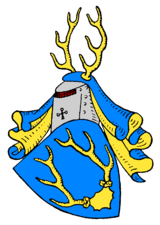You can help expand this article with text translated from the corresponding article in German. (February 2022) Click for important translation instructions.
|


Praschma or Pražma (fully Praschma of Bilkau and Falkenberg; Czech: Pražmové z Bílkova or Páni z Bílkova; Polish: Prazma) is a Moravian noble family.
Notable members include Jan Nepomuk I. Ferdinand Pražma (1726–1804), the founder of the Czech village Pražmo; Friedrich von Praschma, member of the Reichstag and co-founder of the Centre Party (Germany); and Hans Praschma von Bilkau, Reichstag member from 1902 to 1918, member of the Prussian House of Representatives, and Bailiff Knight Grand Cross of the Sovereign Military Order of Malta.
The family seat was in the town of Niemodlin (then known as Falkenberg) until the end of World War II, when the town became part of the nascent Eastern Bloc.
References
- "Historie obce". prazmo.cz. Město Pražmo. Retrieved 26 May 2022.
- Mann, Bernhard; Doerry, Martin; Rauh, Cornelia; Kühne, Thomas, eds. (1988). Biographical handbook for the Prussian House of Representatives: 1867–1918. Dusseldorf: Droste. p. 305. ISBN 3-7700-5146-7.
- Mann, Bernhard; Doerry, Martin; Rauh, Cornelia; Kühne, Thomas, eds. (1988). Biographical handbook for the Prussian House of Representatives: 1867–1918. Dusseldorf: Droste. p. 305. ISBN 3-7700-5146-7.
- Specht, Fritz; Schwabe, Paul (1904). The Reichstag Elections from 1867 to 1903. Statistics of the Reichstag elections together with the programs of the parties and a list of the elected representatives (2nd ed.). Berlin: Carl Heymann. p. 75.
- Reichstag, Deutsches Reich (16 May 2009). "Reichstags-Handbuch. 1912, [a] (1916) = Nachtrag zur 13. Legislaturperiode". Reichstagsprotokolle - Verhandlungen des Deutschen Reichstags und seiner Vorläufer (in German). München, Bayerische Staatsbibliothek: Bayerische Staatsbibliothek. Retrieved 13 February 2022.
- Balfour, Ilona (2018). The Return of the Swallows: Dorothy, Countess Praschma's Memoir. Helene Balfour. pp. 55, 191. ISBN 9781718833920.
This article about a member of the German nobility is a stub. You can help Misplaced Pages by expanding it. |
This surname-related article is a stub. You can help Misplaced Pages by expanding it. |